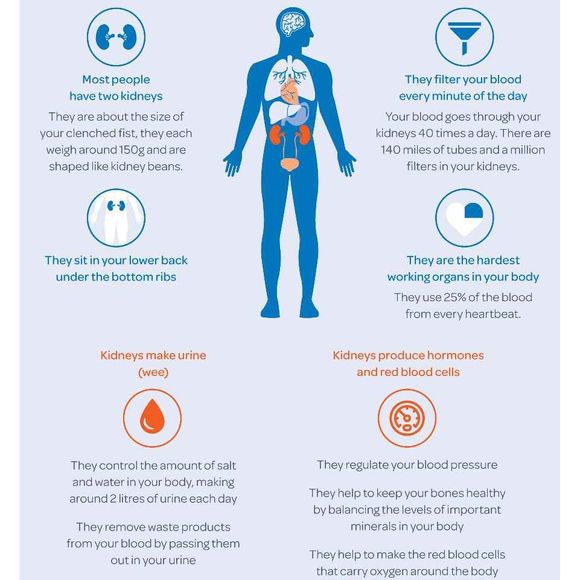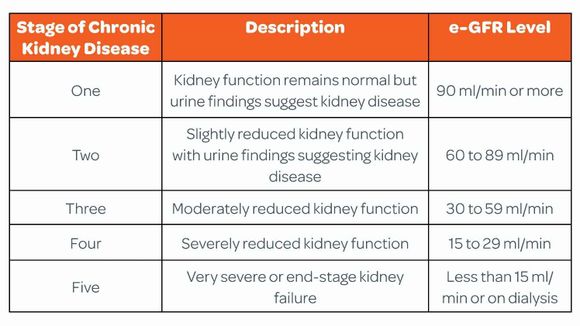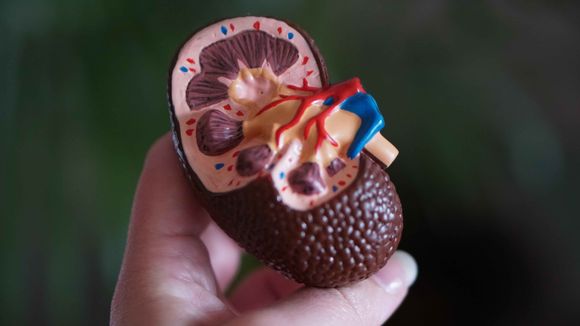Why are the kidneys so important?
Most people know that the main function of the kidneys is to remove waste products and excess fluid from the body. These waste products and excess fluid are removed through the urine. Urine production involves extremely complex stages of excretion and re-absorption. This process is necessary to maintain a stable balance of chemicals in the body. [ref. 1]
Crucial regulation of the content of salt, potassium and acid in the body is carried out by the kidneys. The kidneys also produce hormones that affect the function of other organs. For example, a hormone produced by the kidneys stimulates the production of red blood cells. Other hormones produced by the kidneys help regulate blood pressure and control calcium metabolism. [ref. 2]

The kidneys are small but powerful chemical factories that perform the following important functions:
- Removal of waste products from the body
- Removal of drugs from the body
- Balancing fluids in the body, including maintaining electrolyte balance
- Release of hormones that regulate blood pressure
- Producing an active form of vitamin D that promotes healthy and healthy bones [ref. 3]
- Controlling the production of red blood cells
What is chronic kidney disease?
Chronic kidney disease includes conditions that damage your kidneys and reduce their ability to keep you healthy by filtering waste from your blood. If kidney disease worsens, waste can reach high levels in the blood and cause unpleasant symptoms and complications such as:
- High blood pressure
- Anemia
- Weak bones
- Poor nutrient absorption
- Nerve damage
Kidney disease also increases the risk of heart and blood vessel disease. These problems can appear slowly and progress for a long time.
Early detection and treatment can often prevent chronic kidney disease from deteriorating as well as sparing health. As kidney disease progresses, it can eventually lead to kidney failure, requiring dialysis or kidney transplantation to sustain life.
What are some of the causes of chronic kidney disease?

Chronic kidney disease from a clinical point of view is defined as the presence of some type of renal abnormality or "marker", such as protein in the urine and decreased kidney function for three months or more.
There are many causes of chronic kidney disease. The kidneys can be affected by diseases such as diabetes and high blood pressure. Some kidney diseases are hereditary, that is, there is a family history.
Others are innate; This means that people can be born with an abnormality that can affect their kidneys. Below are some of the most common types and causes of kidney damage.
- Diabetes is a disease in which your body does not produce enough insulin or cannot use normal amounts of insulin properly. This leads to a high blood sugar level, which can cause problems in many parts of your body. Diabetes is the leading cause of kidney disease. IV
- High blood pressure (also known as hypertension) is another common cause of kidney disease and other complications, such as heart attacks and strokes. High blood pressure occurs when the strength of the blood against the walls of the arteries increases. When high blood pressure is controlled, the risk of complications such as chronic kidney disease is lower.
- Glomerulonephritis is a disease that causes inflammation of the small filtering units of the kidneys called glomeruli. Glomerulonephritis can occur suddenly, for example, after strep throat, and a person can get well again. However, the disease can develop slowly over several years and can cause progressive loss of kidney function.
- Polycystic kidney disease is the most common hereditary kidney disease. It is characterized by the formation of kidney cysts, which enlarge over time and can cause serious kidney damage and even kidney failure. Other hereditary diseases that affect the kidneys include Alport's syndrome, primary hyperoxaluria and cystinuria.
What are the early symptoms of chronic kidney failure?
Most people may not have serious symptoms until their kidney disease is advanced. However, you may notice:
- Fatigue and less energy
- Problems with concentration
- Impaired appetite
- Sleep problems
- Muscle cramps at night
- Swollen legs and ankles
- Puffiness around the eyes, especially in the morning
- Dry, itchy skin
- Need to urinate more often, especially at night
Common signs of chronic renal failure include markers used to diagnose reduced GFR, decreased albumin, urinary protein, elevated creatinine or cystatin and markers of underlying conditions dyslipidemia, high blood pressure, glycemic dysregulation, and elevated uric acid levels. Some of these will be further discussed in a separate paragraph.
What are the warning signs of kidney disease?
Kidney disease usually affects both kidneys. If the kidneys' ability to filter blood is seriously damaged by disease, waste and excess fluid can accumulate in the body. Although many forms of kidney disease do not cause symptoms until the end of the course of the disease, there are six warning signs of kidney disease:
- High blood pressure.
- Blood and/or protein in the urine.
- Blood test for creatinine and blood urea (BUN) outside the normal range. BUN and creatinine are wastes that build up in your blood when your kidney function is reduced.
- Glomerular filtration rate (GFR) less than 60. GFR is a measure of kidney function.
- More frequent urination, especially at night; difficult or painful urination.
- Puffiness around the eyes, swelling of the hands and feet.
How is chronic kidney disease detected?
Early detection and treatment of chronic kidney disease are the key to protecting kidney disease from progression to kidney failure. Some tests can be made available for early detection of kidney disease. These include:
- Urine protein test. The albumin-to-creatinine ratio (ACR) estimates the amount of albumin in the urine. Excess protein in your urine may mean that the filtering units of your kidney have been damaged by disease. One positive result may be due to fever or heavy exercise, so your doctor will want to confirm the result with retesting in a few weeks.
- Test for creatinine in the blood. Your doctor should use your results, along with data such as age, race, gender, and other factors, to calculate glomerular filtration rate (GFR). Your GFR is an indicator of kidney function.

Have herbs and supplements been studied for use in chronic kidney disease?
The most common additives tested for use in chronic kidney disease are amino acid supplements used in conjunction with very low protein diets.
Others include alkalizing therapy with potassium citrate salts, vitamin D supplements, and omega-3 fatty acid supplements. Many other supplements have been studied, including vitamin E, antioxidant therapy, CoQ10, N-acetylcysteine, human recombinant superoxide dismutase, potassium, calcium enrichment, turmeric (Curcuma longa) and boswellia (Boswellia serrata), vitamin K, B vitamins, astragalus (Astragalus), cordyceps and Chinese rhubarb (Rheum officinale). [ref. 4]





